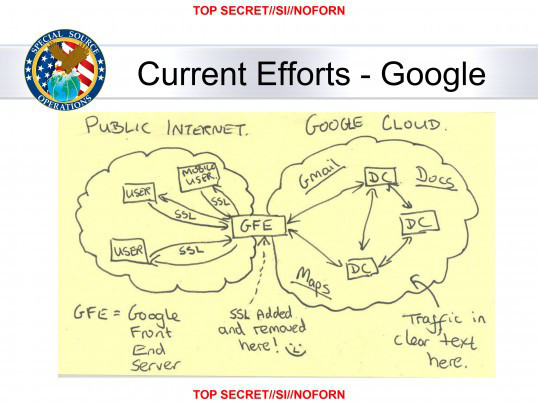NSA Ticks Off Google & Yahoo With Report Of Snooping On Private Data Centers

A recently leaked top secret NSA sketch, complete with smiley face, showing how the agency exploits the connection between Google’s front-end servers and its data centers to then access that data center network and reap massive amounts of information.
The Washington Post reports on the information contained in documents leaked by former government contractor Edward Snowden, the same man responsible for shining a light on the NSA’s PRISM program earlier this year.
Basically, the documents show — and the Post confirmed with its sources — that the NSA was tapping into the communications lines between linked data centers run by Yahoo and Google. This isn’t tapping communication between end-users or even between an end-user and a server. Instead, it’s the siphoning off of information from data centers that share and store this information. It effectively gave the agency the ability to spy on hundreds of millions of users at will.
This backdoor data grab, dubbed MUSCULAR, is also different from the PRISM program, which granted the NSA front-door access to servers via a court order. MUSCULAR exploits the fact that Google and Yahoo use data centers all around the world to get around restrictions on its domestic snooping
According to one document, in a 30-day span, the NSA gathered 181,280,466 new records using this method. The data gathered included not just who was sending and receiving messages, but the actual content.
“We have long been concerned about the possibility of this kind of snooping, which is why we continue to extend encryption across more and more Google services and links,” Google, which has spent billions buying and leasing dedicated fiber lines solely so that the connections between its data centers could not be hacked, said in a statement. The company says it is “troubled by allegations of the government intercepting traffic between our data centers, and we are not aware of this activity.”
Yahoo echoed that sentiment, telling the Post, “We have strict controls in place to protect the security of our data centers, and we have not given access to our data centers to the NSA or to any other government agency.”
Want more consumer news? Visit our parent organization, Consumer Reports, for the latest on scams, recalls, and other consumer issues.

